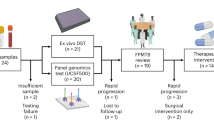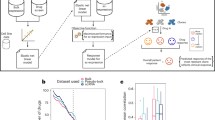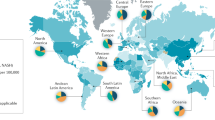Abstract
Although targeted agents are recommended as the first-line treatments for advanced hepatocellular carcinoma (aHCC), systemic chemotherapy or hepatic arterial infusion chemotherapy (HAIC) are still being used in Asian countries. Beside economic considerations, it was found that targeted drugs could not significantly prolong overall survival in aHCC patients with distant metastasis. In addition, chemotherapy could achieve complete response in a small proportion of patients. Here, we aimed to investigate whether combination of three previously identified single nucleotide polymorphism (SNP) predictors (GALNT14-rs9679162, WWOX-rs13338697, and rs6025211) could guide our choice between systemic chemotherapy, HAIC, and targeted agents in aHCC patients. A cohort of 237 real-world aHCC patients (171 receiving systemic chemotherapy followed by various anticancer treatments including sorafenib; 66 receiving HAIC) were included for outcome analysis. By combining the three SNP markers with or without addition of two clinical criteria (tumor diameter <8 cm, neutrophils <80%), small groups of patients were found to harbor high complete response rates to systemic chemotherapy (35.3% if the 3-SNP signature alone matched; 60.0% if clinical criteria also matched). Subsequent sorafenib treatment for chemotherapy non-responders was associated with longer overall survival (P < 0.001). In HAIC-treated patients, GALNT14-rs9679162 genotype “GG” was associated with longer overall survival (P = 0.019, median survival > 10.5 months). In conclusion, pre-test for the 3-SNP signature in aHCC patients could identify potential systemic chemotherapy or HAIC responders. Chemotherapy non-responders still benefited from subsequent sorafenib treatment. Accordingly, we propose a roadmap for aHCC patients when chemotherapy or HAIC is to be used.
This is a preview of subscription content, access via your institution
Access options
Subscribe to this journal
Receive 6 print issues and online access
$259.00 per year
only $43.17 per issue
Buy this article
- Purchase on Springer Link
- Instant access to full article PDF
Prices may be subject to local taxes which are calculated during checkout




Similar content being viewed by others
References
Ferlay J, Soerjomataram I, Dikshit R, Eser S, Mathers C, Rebelo M, et al. Cancer incidence and mortality worldwide: sources, methods and major patterns in GLOBOCAN 2012. Int J Cancer. 2015;136:E359–86.
Knudsen ES, Gopal P, Singal AG. The changing landscape of hepatocellular carcinoma: etiology, genetics, and therapy. Am J Pathol. 2014;184:574–83.
Yeh CT, Chen HC, Sung CM, Hsu CL, Lin CC, Pan KT, et al. Retrospective comparison between a regular and a split-dose protocol of 5-fluorouracil, cisplatin, and mitoxantrone for the treatment of far advanced hepatocellular carcinoma. BMC Cancer. 2011;11:117.
Llovet JM, Real MI, Montaña X, Planas R, Col S, Aponte J, et al. Arterial embolisation or chemoembolisation versus symptomatic treatment in patients with unresectable hepatocellular carcinoma: a randomised controlled trial. Lancet. 2002;359:1734–9.
Kudo M, Finn RS, Qin S, Han KH, Ikeda K, Piscaglia F, et al. Lenvatinib versus sorafenib in first-line treatment of patients with unresectable hepatocellular carcinoma: a randomised phase 3 non-inferiority trial. Lancet. 2018;391:1163–73.
Bruix J, Qin S, Merle P, Granito A, Huang YH, Bodoky G, et al. Regorafenib for patients with hepatocellular carcinoma who progressed on sorafenib treatment (RESORCE): a randomised, double-blind, placebo-controlled, phase 3 trial. Lancet. 2017;389:56–66.
European Association for the Study of the Liver. Clinical practice guidelines: management of hepatocellular carcinoma. J Hepatol. 2018;69:182–236.
Llovet JM, Ricci S, Mazzaferro V, Hilgard P, Gane E, Blanc JF, et al. Sorafenib in advanced hepatocellular carcinoma. N Engl J Med. 2008;359:378–90.
Cheng AL, Kang YK, Chen Z, Tsao CJ, Qin S, Kim JS, et al. Efficacy and safety of sorafenib in patients in the Asia-Pacific region with advanced hepatocellular carcinoma: a phase III randomised, double-blind, placebo-controlled trial. Lancet Oncol. 2009;10:25–34.
Bruix J, Cheng AL, Meinhardt G, Nakajima K, De Sanctis Y, Llovet J. Prognostic factors and predictors of sorafenib benefit in patients with hepatocellular carcinoma: analysis of two phase III studies. J Hepatol. 2017;67:999–1008.
Kudo M, Trevisani F, Abou-Alfa GK, Rimassa L. Hepatocellular carcinoma: therapeutic guidelines and medical treatment. Liver Cancer. 2016;6:16–26.
Rimola J, Díaz-González Á, Darnell A, Varela M, Pons F, Hernandez-Guerra M, et al. Complete response under sorafenib in patients with hepatocellular carcinoma: relationship with dermatologic adverse events. Hepatology. 2018;67:612–22.
Ikeda M, Okusaka T, Furuse J, Mitsunaga S, Ueno H, Yamaura H, et al. A multi-institutional phase II trial of hepatic arterial infusion chemotherapy with cisplatin for advanced hepatocellular carcinoma with portal vein tumor thrombosis. Cancer Chemother Pharm. 2013;72:463–70.
Yuan JN, Chao Y, Lee WP, Li CP, Lee RC, Chang FY, et al. Chemotherapy with etoposide, doxorubicin, cisplatin, 5-fluorouracil, and leucovorin for patients with advanced hepatocellular carcinoma. Med Oncol. 2008;25:201–6.
Mazzanti R, Giallombardo AL, Mini E, Novili S, Neri B, Arena U, et al. Treatment of locally advanced hepatocellular carcinoma by hepatic intra-artery chemotherapy: a pilot study. Dig Liver Dis. 2004;36:278–85.
Tanaka K, Yabushita Y, Nakagawa K, Kumamoto T, Matsuo K, Taguri M, et al. Debulking surgery followed by intraarterial 5-fluorouracil chemotherapy plus subcutaneous interferon alfa for massive hepatocellular carcinoma with multiple intrahepatic metastases: a pilot study. Eur J Surg Oncol. 2013;39:1364–70.
Boschetti G, Walter T, Hervieu V, Cassier P, Lombard-Bohas C, Adham M, et al. Complete response of hepatocellular carcinoma with systemic combination chemotherapy: not to get out the chemotherapy? Eur J Gastroenterol Hepatol. 2010;22:1015–8.
Liang KH, Lin CC, Yeh CT. GALNT14 SNP as a potential predictor of response to combination chemotherapy using 5-FU, mitoxantrone and cisplatin in advanced HCC. Pharmacogenomics. 2011;12:1061–73.
Yeh CT, Liang KH, Lin CC, Chang ML, Hsu CL, Hung CF. A single nucleotide polymorphism on the GALNT14 gene as an effective predictor of response to chemotherapy in advanced hepatocellular carcinoma. Int J Cancer. 2014;134:1214–24.
Liang KH, Yeh TS, Wu RC, Yeh CN, Yeh CT. GALNT14 genotype is associated with perineural invasion, lymph node metastasis and overall survival in resected cholangiocarcinoma. Oncol Lett. 2017;13:4215–23.
Tsou YK, Liang KH, Lin WR, Chang HK, Tseng CK, Yeh CT. GALNT14 genotype as a response predictor for concurrent chemoradiotherapy in advanced esophageal squamous cell carcinoma. Oncotarget. 2017;8:29151–60.
Lin WR, Chiang JM, Liang KH, Lim SN, Lai MW, Tsou YK, et al. GALNT14 genotype predicts postoperative outcome of stage III colorectal cancer with oxaliplatin as adjuvant chemotherapy. Medicine. 2016;95:e3487.
Chen TH, Lin WR, Lee C, Chiu CT, Hsu JT, Yeh TS, et al. Prognostic stratification of advanced gastric signet ring cell carcinoma by clinicopathological factors and GALNT14 genotype. J Cancer. 2018;9:3540–7.
Lin WR, Hsu CW, Yeh CS, Chen YC, Chang ML, Liang KH, et al. Combinations of single nucleotide polymorphisms WWOX-rs13338697, GALNT14-rs9679162 and rs6025211 effectively stratify outcomes of chemotherapy in advanced hepatocellular carcinoma. Asia Pac J Clin Oncol. 2018;14:e54–e63.
Lin CC, Hung CF, Chen WT, Lin SM. Hepatic arterial infusion chemotherapy for advanced hepatocellular carcinoma with portal vein thrombosis: impact of early response to 4 weeks of treatment. Liver Cancer. 2015;4:228–40.
Liang KH, Lin CL, Chen SF, Chiu CW, Yang PC, Chang ML, et al. GALNT14 genotype effectively predicts the therapeutic response in unresectable hepatocellular carcinoma treated with transcatheter arterial chemoembolization. Pharmacogenomics. 2016;17:353–66.
Acknowledgements
The authors thank technicians in Liver Research Center, Chang Gung Memorial Hospital for their excellent technical help.
Funding
This study was supported by grants from Chang Gung Memorial Hospital, Linkou branch (CMRPG3F1602) and from Ministry of Health and Welfare (MOHW107-TDU-B-212-114023).
Author information
Authors and Affiliations
Contributions
C.T.Y. designed and supervised the study; C.T.Y. and C.C.L. drafted the paper; C.C.L., C.W.H., Y.C.C., M.L.C., M.W.L., C.L.L., and R.N.C. collected samples, performed all assays, and interpreted the data; C.T.Y. and K.H.L. performed statistical analysis.
Corresponding author
Ethics declarations
Conflict of interest
The authors declare that they have no conflict of interest.
Additional information
Publisher’s note Springer Nature remains neutral with regard to jurisdictional claims in published maps and institutional affiliations.
Rights and permissions
About this article
Cite this article
Lin, CC., Hsu, CW., Chen, YC. et al. A GALNT14 rs9679162 genotype-guided therapeutic strategy for advanced hepatocellular carcinoma: systemic or hepatic arterial infusion chemotherapy. Pharmacogenomics J 20, 57–68 (2020). https://doi.org/10.1038/s41397-019-0106-0
Received:
Revised:
Accepted:
Published:
Issue Date:
DOI: https://doi.org/10.1038/s41397-019-0106-0
This article is cited by
-
GALNT14 genotype-guided chemoembolization plus sorafenib therapy in hepatocellular carcinoma: a randomized trial
Hepatology International (2022)



